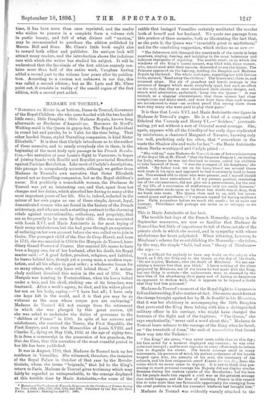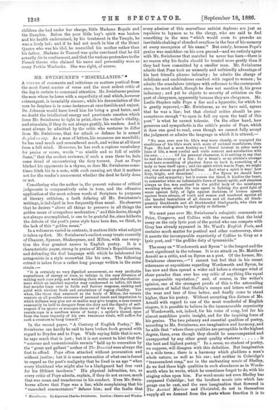MADAME DE TOURZEL. , "BARONESS DE KORPF is, at bottom, Dame
de Tourzel, Governess of the Royal Children: she who came hooded with the two hooded little ones ; little Dauphin ; little Madame Royale, known long afterwards as Duchesse d'Angouleme. Baroness de Korff's Waiting-maid is the Queen in gypsy-hat. The Royal Individual in round hat and peruke, he is Valet for the time being. That other hooded Dame, styled Travelling-companion, is kind Sister Elizabeth." It is thus that Carlyle introduces us to the author of these memoirs, and to nearly everybody else in them, in the beginning of the most truly epic passage in his French Revolts- tion,—bis narrative of poor Louis's flight to Varennes, in hopes of joining hands with Bouill6 and Royalist provincial Reaction against Parisian Revolution. Like most of Carlyle's descriptions, this passage is scrupulously accurate, although we gather from Madame de Tourzel's own narrative that Sister Elizabeth figured not as travelling-companion, but as the Royal children's nurse. Not positively a remarkable woman, the Duchesse de Tourzel was yet an interesting one, and that, apart from her charges and her duties, which absorbed her during so many of the most important years of her life. She is, indeed, reflected in the mirror of her own pages as one of those simple, devout, loyal, domesticated women who are found in the history of the French aristocracy, and who are such a startling contrast to the charming rebels against conventionality, orthodoxy, and propriety, that are so frequently to be seen by their side. She was associated with Louis XVI. and Marie Antoinette in the most trying of their many misfortunes, but she had gone through an experience of suffering on her own account before she was called on to join in theirs. The youngest child of the Due de Croy-Havre, and born in 1749, she was married in 176 t to the Marquis de Tourzei, here- ditary Grand Provost of France. Her married life seems to have been a happy one, for of her husband, after his death, his Royal master said :—" A good father, prudent, religious, and faithful, he leaves behind him, though yet a young man, a spotless repu- tation, and all his affairs in good order ; a wholesome lesson for so many others, who only leave evil behind them." A melan- choly accident dissolved this union in the end of 1786. The Marquis was hunting in Fontainebleau, when his horse bolted under a tree, and his skull, striking one of its branches, was fractured. After a week's agony, he died, and his widow placed her son on his body, saying :—" I have lost all ; I have only one hope left in the world, and it is that you may be as virtuous as the man whose corpse you are embracing." Madame de Tourz:1 did not emerge from the retirement in which she was plunged by this great sorrow, till she was asked to undertake the duties of governess to the "children of France" in 1789. In spite of her sorrows and misfortunes, she survived the Terror, the First Republic, the First Empire, and even the Monarchies of Louis XVIII. and Charles X., dying on May 15th, 1832, at the age of eighty-two. It is from a manuscript in the possession of her grandson, the Due des Cars, that this narrative of the most eventful period in her life has been published.
It was in August, 1789, that Madame de Tourzel took up her residence in Versailles. She witnessed, therefore, the invasion of the Royal Palace in October of that year by the Revolu- tionists, whom she terms "brigands," that led to the King's return to Paris. Madame de Tourzel gives testimony which may fairly be regarded as unimpeachable, to the courage displayed at this terrible time by Marie Antoinette,—for some of the Memoirs ef the Duchess. de Toursel, Governess to the Children cf Franco during the Years 17149. 1790, 1791, 1792, 1793. and 1795. Published by the Dec des Cars. 2 vo:s. London Remington and Co. 1886.
rabble that besieged Versailles certainly meditated the murder both of herself and her husband. We quote one passage from this portion of these memoirs, both as illustrating the fact that, as she puts it, the Queen was "invariably great in misfortune," and for the concluding suggestion, which strikes us as new :—
" The fishwomen still thronged the courtyards of the castle in large numbers, singing, dancing, and indulging in the most boisterous and indecent transports of rejoicing. The marble court, on to which the windows of the King's rooms opened, was filled with these women, who, intoxicated with their success, demanded to see the Queen. The Princess appeared on the balcony, holding the Dauphin and Madame Royale by the hand. The whole multitude, regarding her with furious looks, shouted, Send away the children.' The Queen sent them in, and returned alone. Her air of grandeur and heroic courage in the presence of danger which made everybody quail, had such an effect on the mob, that they at once abandoned their sinister designs, and, struck with admiration, exclaimed, Long live the Queen!' It was noticed, as a singular circumstance, that these women had clear complexions and white teeth, and wore finer linen than such women are accustomed to wear—an evident proof that among them there were very many who were paid to play their parts."
It is thus that Louis XVI. and Marie Antoinette ever figure in Madame de Tonrzel's pages. He is a kind of a compound of Ethelred the Unready and Henry VI.,—" feckless," procrasti- nating, yet not without a sort of Oriental moral courage. She, again, appears with all the frivolity of her early days eradicated by misfortune, a chastened Margaret of Navarre, knowing only too well, predicting only too often, that "somewhere in the waste the Shadow sits and waits for her,"—the Marie Antoinette whom Burke worshipped and Carlyle pitied : —
"She told us," says Madame de Tout zel, in one of her reminiscences of the Royal life at St. Cloud, "that the Emperor Francis I., on leaving for Italy, whence be was not destined to return, called his children to take farewell of them. 'I was the youngest of his daughters,' she added. My father took me on his knee, kissed me several times with tears in his eyes, and appeared to find it extremely hard to leave me. This seemed odd to those who were present, and I myself should perhaps not have remembered it if my present position, reminding me of the circumstance, did not give me a presentiment, for the rest of my life, of a succession of misfortunes only too easily foreseen.' The impression made upon us by these last words was so deep, that we burst into tears. The Queen then said to us, with her accus- tomed grace and goodness = I reproach myself for having saddened you. Calm yourselves before we reach the castle ; let us unite our courage. Providence will perhaps not make us so unhappy as we think.'"
This is Marie Antoinette at her best.
The terrible last days of the French Monarchy, ending in the September massacres, are now so familiar that Madame de Tourzel has but little of importance to tell of them outside of the private circle in which she moved, and in sympathy with whose misfortunes her heart palpitated. When referring, however, to Mirabeau's scheme for re.establishing the Monarchy—she takes, by the way, the simple "bold, bad man" theory of Mirabeau- she says :—
" It is difficult for anybody to have any doubt on the subject who heard, as I did, the King say to the Queen on the day of his death, 'Do not rejoice, Madame, over the death of Mirabean. We are sus- taining a heavier loss than you think.' I know nothing of the plans projected by Mirabeau, nor of the terms he had made with the King, but one thing is certain—the malcontents were so alarmed by the bare idea of his abandoning their party and of having so dangerous an opponent to reckon with, that it appears to be beyond a doubt that they had him poisoned."
Madame de Tourzel's account of the Royal flight to Varennes is full and interesting, if also matter-of-fact. She seems much hurt at the charge brought against her by M. de Bourne in his Memoires, that it was her obstinacy in accompanying the little Dauphin that prevented the King from taking with him a distinguished military officer in his carriage, who might have changed the fortunes of the flight and of the fugitives. "The Queen," she says emphatically, "never said a word about this." Madame de Tourzel bears witness to the courage of the King when he faced, on "the twentieth of June," the mob of sanseuloiles that forced their way into the Tuileries :— "The King," she avers, "was never more noble than on this day ; his face never for a moment displayed any emotion ; he was over calm and intrepid ; and he rose superior to every effort made to induce him to degrade his crown. Ilia heroic courage amid so many miscreants, his presence of mind, his patient endurance of the insults heaped upon him, the serenity of his soul, the constancy of his refusals, and his firm resignation saved Fiance for this dept, from the crime which we never cease to deplore. It is sad to thin.]: that pos- sessing so mach personal courage his Majesty did not display similar firmness during the various epochs of the Revolution ; but his love for his people made him regard a civil war as the greatest scourge that could happen, and the fear of involving France in this caused him to miss more than one favourable opportunity for emerging from the cruel position to which his excessive kindness bad brought him."
Madame de Tourzel was evidently warmly attached to the
children she had under her charge, little Madame Royale and the Dauphin. Before the poor little boy's spirit was broken and his health undermined, by his treatment in the Temple, he was a lively lad ; and if he had not much in him of the Henri Quatre who was his idol, he resembled his mother rather than his father. Madame de Tourzel was quite convinced that he did actually die in confinement, and that the various pretenders to the French throne who claimed his name and personality were so many Perkin Warbecks. She was right, of course.



































 Previous page
Previous page